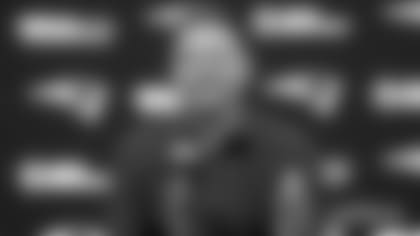HEAD COACH BILL BELICHICK
Conference Call
Tuesday, November 26, 2019
Q: What have you noticed from Deshaun Watson in close and late-game situations?
BB: That he and the Texans have made a lot of explosive plays. Look, the New Orleans game, they're down by six with no timeouts, they've got the ball on their own 25-yard line, score in 14 seconds – the two big plays to [DeAndre] Hopkins and [Kenny] Stills. Then the Atlanta game, down by eight, two minutes to go, score on a 50-yard pass on a double-move to [Will] Fuller. Fourth-and-one situations, Watson's had a couple big keepers like he did against New Orleans and scored from about the 20-yard line or so on a zone read and he kept the ball. So, he's very, very good. He's a very accurate downfield passer, he's made some great throws on double-moves, seam routes, post patterns, go routes, things like that. And of course, we all know he's a very athletic guy with the ball in his hands. So, [he is] dangerous, can score from anywhere at any time, doesn't take long. It'll be a big challenge for us for 60 minutes, but even with a few seconds to go, it's a long way from – any game's a long way from being over if he has his hands on the ball.
Q: How do you feel your guys have done in terms of finishing late in games so far this year?
BB: Well, it's always an area that's important, but it doesn't really mean anything. The only thing that matters is what happens this week, so hopefully we'll have an opportunity to be in that situation. But again, as I said, it's a lot to prepare for and the Texans have a lot of explosive players, very explosive offense and it'll be a big challenge for us. So, if it comes up, we'll see what we can do this time, but it'll be hard.
Q: HBO is promoting your documentary with Nick Saban. Have you seen it, and what was that like to be a part of?
BB: No, I haven't seen it. Nope.
Q: Have you enjoyed watching how that and the NFL Network 100 series has helped promote football the way it is?
BB: Yeah. You know, I haven't really seen it. I saw part of the show that came out last week, I think it was on Friday night. I saw part of that, but I haven't seen the whole thing. And with Coach Saban, I spent time with him at the Alabama pro day last spring, so I was down there anyway. Coach Saban and I always get together informally, catch up, and this time we did it in an interview kind of setting. But, it's always good to be with Nick. He's a great guy. There's nobody I respect in football more than Nick Saban, and I've learned an awful lot from him. So, we've had a lot of great conversations through the years. So, that's always a good opportunity for me to spend some time with somebody that I have a lot of respect for, and the fact that NFL Films wanted to do something with us, I was more than happy to accommodate them and do it with Nick. So, I'm sure they'll do a good job. It's hard to make me look good, but if anybody can, NFL Films can do it.
Q: Are there things that you learned about the game from the NFL 100 series that you were able to incorporate into your coaching now?
BB: I learned a lot. It was a great experience. I watched a lot of film of players in the '30s, the '40s, the '50s and the '60s. I watched quite a bit of that over the summer and last spring, and it was very enlightening in studying the great players in different eras and how the game was played. You see some plays, you see some strategy, but you also see the players, and not just the guys you're watching, obviously, but the other guys that are involved there. Two-way football, the kicking game, there were a lot more kicking plays. It's all just continuous film; it's not really broken up into offense and defense. That didn't start until a little bit later in the '60s and so forth, but the earlier games it's just sequential, so you're watching guys go both ways and both sides of the ball and so forth. So yeah, I learned a lot about the players, a lot I learned about the history – how things, I would say, evolved to a degree. And then, as part of the top 100 shows there, actually being able to talk to some of those players and get their perspective and reflections on the game, and other aspects of their career and life, that was great. The interaction with some of the great people that are on the panel, that are on this committee, and their insights – people like Ron Wolf and John Madden, guys like that. I mean, there's so many of them. I can list them all, but they all have a lot of very interesting insight to the players and the game, and that sparked – for me – sparked me to go back more closely at some of the things that they brought up and enlightened me on. So, the whole process was great, and I think in a way it's definitely made me a better coach from the things that I've learned. It's reinforced some things, and it's also opened my eyes to some, I would say, other areas of coaching that I don't want to say were overlooked – that would be the wrong word – but the emphasis maybe has been more, since I started doing that, on certain fundamental things that are I think critical to the foundation of successful plays and successful teams and successful football. So yeah, it was a very great honor to be a part of it, and very educational, informative, and I would say, motivating to indulge in those in the process.
Q: Are the cover zero and the rest of the variety of coverages you've shown this year always things you've felt comfortable calling, or is it unique to this year's group given all of the experience that you have in the secondary?
BB: Yeah, Ben [Volin], I don't think we've called – I could be wrong – but I don't think we've called anything this year that's something that we haven't done before. I would say, if anything, it might be a little less than what we've done in the past. But, our players have a very good understanding of our defensive concepts and some of the adjustments that we can make within any given call. So, we could call something and there could be two or three or four things that's dependent on how the offense is aligned, and who's where and what the situation is, that we could make an adjustment to that call. And I would say that the players have done a great job of utilizing those calls, those tools, to put themselves and put the team in better or advantageous situations, on leverage and things like that. So, I think there's definitely – the experience that you referred to has paid off in those areas. But no, I wouldn't say we're like dreaming up 11 new defenses. But, the ones that we run, the number might be a little bit fewer. I'm not sure, I'd have to go back and take a closer look at that historically, but my guess is that it would be the same, or maybe a little bit fewer. But, within those calls, probably a higher degree of flexibility and versatility on both the back and the front. I mean, because guys like [Dont'a] Hightower, [Kyle] Van Noy, [Jamie] Collins, those guys, Adam Butler – the guys that are involved in the front – [John] Simon, [Ja'Whaun] Bentley, [Elandon] Roberts – those guys really do a good job of working with the secondary as part of that whole process. So, I just wouldn't want to limit to one, or two guys or one position. It's really sometimes an entire team process that's involved. [Patrick] Chung certainly is a key guy for us.
Q: Why do you think the two-deep safety looks were beneficial against the Cowboys?
BB: I mean, I'd say we've been playing it all year, Ben. I think you can find it in any game. You can certainly find a lot of it in the Eagles game. I don't think you'll see a lot of it in the Baltimore game just because of the nature of their offense. But yeah, I think if you go back, that's one of the things we do. We play some two-deep, we play some single-high, we play some with really no deep field players. So, I think you'll find it in every game. The percentages might vary a little bit. Some of it's a reflection of what the offense is in, that might have an effect on it too, but I think you'll see it in every game.
Q: Was tripping something that you had seen from the Cowboys on film and asked the NFL or the officials to look more closely at entering the game?
BB: No. I mean, the Cowboys are one of the least penalized teams in the league. They do a great job. I want to say they had the fewest pre-snap penalties – you know, illegal formation and false start and stuff like that. They had one in our game offensively, but they rarely have that. They don't have a lot of offensive holding or pass interference or penalties like that. They're one of the least penalized teams in the league. I think that their coaching staff, Coach [Jason] Garrett and their coaches, they do a great job of that. I'd say just in general they've had some personal foul penalties, but as far as the fundamentals of blocking, tackling, alignment – things like that – offsides, false starts, they're one of the least in the league.
Q: So you didn't ask if the officials could watch out for it?
BB: Yeah, I'm saying it would be hard to find examples of it because they're just a team that was not penalized very much. We haven't been penalized a lot either. I mean, when you looked at the matchups in that game from a penalty standpoint, statistically it didn't look like there was a big edge either way. And sometimes, it evens out. One team has more in one area and the other team might have more in another area or something like that. So, I would say that really wasn't the case. I was really impressed in watching Dallas, and then going back and looking at the numbers, they only had like three or four of those pre-snap penalties offensively the entire season, which is – I mean, hell, sometimes you see that in one game. But, those guys rarely had that, and they didn't have very many offensive interference, and holding and stuff like that. I mean, they just don't do much of it.
Q: How have you seen Elandon Roberts embrace playing fullback and develop in that role?
BB: Well, Elandon's got a very physical style of play. He has a good skillset. He can run, he's a very compact guy with good lower body strength and leverage and power, and I think we've all seen that on the defensive side of the ball and in the kicking game. We've lost a couple fullbacks here on our roster with James Develin and Jak [Johnson], so we use Elandon some at fullback. I mean, he had a big block in the Philadelphia game at the end of the game in the four-minute offense. That's probably one of the best blocks we've had all year. But, we started using him a few weeks ago – it was around the bye week. He's done it in the past. Elandon's got a great attitude. He's, again, elected team captain and I think that's a reflection of his hard work and unselfish attitude and play. He's been willing to do whatever he can to help the team win, and he's certainly helped us in that four-minute offense last week. He helped us against the Eagles, too; we just weren't able to pick it up. So, he blocks well. It's a tough position to play. There's a lot of things that happen in front of you. You have a guy you're assigned to block, but there's a lot of things that happen by the time you get to the guy you're supposed to block with line and the movement and the defensive players and where the guy you're blocking – if he just stands there, great, but a lot of times he moves or goes somewhere else based on the flow of the play or what the defensive line does in front of him. So, there's an element to tracking a guy and making adjustments, and so forth. So, like I said, it's a little bit of a new position for Elandon, I mean, since high school or whenever the last time he played it was. But, he's worked hard at it and gotten better at it, so if we get into those situations and we need somebody that can do that, I think he' shown that he's capable of it. You know, we've done that before with other defensive players in similar situations, or some offensive linemen – you know, [Russ] Hochstein, Dan Connolly, [Dan] Klecko, guys like that. And then use some guys at fullback like [Richard] Seymour, or a tight end like [Mike] Vrabel. So, there's a variety of ways to get that done.
OFFENSIVE COORDINATOR JOSH MCDANIELS
Conference Call
Tuesday, November 26, 2019
Q: With a 13-minute halftime and half of the coaches scrambling down from the coaching booth, how much are you able to get accomplished during halftime?
JM: Yes, it's a short period, but the guys have very specific roles in that regard in terms of the things that they're responsible to keep track of and communicate, and usually we try to get a little bit of a jump start on that. If the defense is out there in the last couple minutes then we would be talking about some of the things we want to discuss at halftime with the players, some adjustments we would make, anything that's given us issues. You want to discuss those things and make sure that we have those things taken care of. If you're on offense at the end, like we were the other night, certainly if you discussed anything prior to that, then that list has already begun. We took up the last two-and-a-half minutes of the second quarter the other night, so really didn't get that opportunity to do that. But you're walking into the tunnel, you usually walk with a couple of the guys on the field and they have a few things that they want to make sure that we get across. Our players are great. Right when we get into the locker room, they sit, give us their attention, we discuss a couple things. You can't go over everything, so you have to make sure you hit the big things. Anything that may be an issue that's come up repeatedly in the first half that we need to address, we try to do that right away. And anything that we need to adjust or anything we're going to change or put in at halftime, we discuss that. We want to try to make sure you let them know what we're going to try to start with in the third quarter as we go back out there. It happens quick, but we have a veteran staff. The guys do a great job, the assistant coaches do a great job of making sure that all the things that they want me to be aware of that they have them charted, listed and ready to discuss and quickly jot them on the board and then give the message to the players and then go back out and play.
Q: Have you seen Jakobi Meyers and N'Keal Harry improve on the details and running routes?
JM: They both have worked really hard at trying to do the things we're asking them to do. There's nobody that comes from college and has been doing things the way that we're asking them to do them right away, I don't really care what position it is. And so, that position is really no different than the others. You want to train them to create good habits both in releasing, alignment, route running, catching the football, how to finish different routes versus different techniques in coverage. They've seen a lot of different coverages that you don't always see in college football. They continue to work really hard in practice. Joe [Judge] and Troy [Brown] have done a great job of bringing them along. Tom [Brady] has done a great job of working with them in practice. The biggest thing for us is we just continue to try to improve on something. If you keep making progress with young players then that's all you can ask of them. I know their work ethic and their attitude has been great; they're very eager to try to do things the way that we want them to do them. They both went out there and made some plays that helped us win. A lot of things that we can do better, a lot of things that we can clean up and those game experiences always contribute to the improvement of a player. There's nothing you can do to simulate the game. We have a great opportunity this week to try to build off of last week.
Q: How has the Texans defense changed not having Jadeveon Clowney and J.J. Watt? What impresses you about the way Romeo Crennel has implemented his defense with the personnel he has now?
JM: The scheme itself really hasn't changed much. Romeo – the one thing you know is they're going to be sound, they're going to play really good fundamental football, they don't beat themselves, they rarely give up big plays, they do a great job of communicating and disguising what they're doing so that you don't get – you don't have an advantage in that area. And they play really hard. That has been the hallmark of every defense that I've ever competed against Romeo with and that is the same thing you can say about this group. They're well coached, they play hard, they're never out of position and they do the things that they're being asked to do within the scheme extremely well and they play physical. Those two players you mentioned are great, great players and they've always been difficult to compete against, but this is a team that has a lot of depth. They have a lot of good players that have stepped in and really are contributing on their defensive front, which is really where it starts. This is a physical group, they can rush the passer, they blitz plenty, they're real physical up front on the down-three and their base defense, it's hard to run on them, they tackle well in the front. [Whitney] Mercilus is a really good edge rusher. [Brennan] Scarlett plays with a great, great motor. We have a ton of respect for those guys. [Benardrick] McKinney is one of the best inside linebackers that we play every year. [Zach] Cunningham has really come on in the three years that we've had an opportunity to compete against him. [D.J.] Reader, [Brandon] Dunn and [Angelo] Blackson, those guys and [Carlos] Watkins, the guy from Clemson, they really – they're physical, they're hard to move out of there, they play their technique really well. The [Jacob] Martin kid that they got from Seattle, he's really got speed on the edge. They challenge you in a lot of different ways. The one thing that you know you're going to have to do is you're going to have to consistently execute against this team because they're not going to give it to you in three plays. You're going to have to string together eight, 10, 12 plays of good, solid execution and you're going to have to stay out of long yardage, avoid penalties and negative plays to give yourself an opportunity to put together scoring drives. That's the challenge. Playing down there is always an extra burden because of the noise. This is a really good unit. We're going to have to have a great week of practice and preparation for them. Completely different play style, too, than the one we just got done playing against Dallas. This will be one of those unique transitions for our guys just in terms of the way they play.
Q: What are your impressions of Isaiah Wynn's play in his first game back? Do you feel that you got a boost in the run game with his presence at left tackle?
JM: Yeah, it was good to get Isaiah back out there, good for him to get back out there. I know he was eager to do that. There's nothing that you can do to really simulate the movement and the speed of the game in a National Football League regular season game. For any player coming off of a rather long period of time off, it is a little bit of an adjustment period. I think he acclimated well once he got settled in. He's playing against good players over there on the left and I thought he held his own. I thought he did some really good things and then did some things where we'll look forward to improving this week. He knew it right away – we talked since the game and there's an eagerness now to try to improve on the things that he saw and felt that he didn't do as well as he wanted to. We surely think we can make progress and push forward this week with that. He tried to finish, he was physical. We ran behind him a little bit in the running game and made some yards, had some good blocks and had some things that we can work out. Always a good thing to get your first game under your belt after a long way off and we look forward to having a good week of preparation and practice with him and hoping that he can continue to improve and get better as we finish the season.
Q: Earlier Bill Belichick said that he thought Elandon Roberts' block late in the game on one of Sony Michel's runs was one of the best blocks this season. What have you seen from Roberts in that role?
JM: Yes, Elandon, he made a few good blocks there at the end. He does everything you ask him to do – what a great teammate, that's why he's a captain. He's a good player and he's a great teammate. He's unselfish and we've asked him to play a lot of different roles. He played in the kicking game a number of snaps, on defense, on offense. Whatever he can do to help the team, he's got a great attitude. He's physical, he's aggressive, he loves contact and hitting. I think he did, he made a few really important blocks that would have made James Develin very proud towards the end of the game there. We have a lot of confidence in him and that grouping. I think any time you take a guy over there that hasn't played a lot of snaps on offense, there's just an adjustment period in terms of the way we call things, how we get in and out of plays, changing plays, et cetera, for them to get comfortable and feel really good about. I think he's really made strides there, I think he feels comfortable with his role each week at the game and we'll figure out how big or small that role's going to be as we move forward each week.
CORNERBACKS COACH STEVE BELICHICK
Conference Call
Tuesday, November 26, 2019
Q: How important is it that your defensive backs meet together in the same room when you go through game film? Does it help foster the versatility of certain players who are able to play both safety and cornerback? What can you say about Jonathan Jones' development as he becomes a more versatile defender?
SB: Yeah, I think Jon always has had a lot of versatility within our defense. We are just asking him to do a little bit more this year, and he's handled it all really well. He's a really smart kid, he's a tough kid, he works really hard, so that stuff hasn't really been a problem for him. In terms of the meeting, me and Mike [Pellegrino] just felt like the best thing to do this year with this group was to meet as a unit. We've got a lot of guys in different roles, there's a lot of crossover, coaching points from player-to-player. It's not as specific as it was in the past, so there's a lot of different things those guys are being asked to do, so the coaching points relate to everybody in the room, not just one or two guys specifically. We just felt that that's the best thing for the team is to put everybody in one room and try and make sure we get everybody on the same page. It all starts with communication, getting the call and getting lined up. Without good communication, we don't really even give ourselves a chance. So, it all starts there. And then, like you said, Jon's ability to handle versatile roles – that's everybody on the defense. They all play off each other, they all do different things, so we just try and keep it basic and keep it as simple as we can for everybody so we can maximize everybody's abilities.
Q: When facing a mobile quarterback and an offense with talented wide receivers like DeAndre Hopkins and Will Fuller, how do you get your players ready when they will have to turn around and run downfield to prevent guys from going deep, but every now and then, the quarterback will take off and run? How do they avoid getting too deep in a spot where they're turned around and not looking at the quarterback who has taken off downfield? And how do they adjust when that sort of play happens?
SB: That's a good question. You know, it's hard. All those scramble plays and extended plays, they're all a little bit different. Sometimes the quarterback gets more depth in the pocket and works backwards, instead of kind of favoring a side of the field and scrambling out towards the sideline. And, for different quarterbacks, they can cut the field off where they really are only looking to throw to the side that they're scrambling, too. We've played against other quarterbacks who will throw the ball across the field back across their body, so you've got to defend the whole field. For those coverage players, it's about instincts. It's tough to always coach the right thing on those plays or tell them what to do beforehand, like, "You should do this when this happens, you should do that when this happens," just because those plays are loose plays. Their offense doesn't really draw those up; they just kind of happen as the play plays out. So, got to rely on the players' instincts, making the right decision, not coming out of coverage, making sure you lock on your guy. That obviously adds a whole other element to it, like you said, with these dangerous receivers being able to get open. I mean, even if you're covering Hopkins, he's still open because of his strong hands and catch radius. So, it's a huge challenge. Some quarterbacks scramble to throw; some quarterbacks scramble to run. It could depend on if there's space in the middle of the defense to run. So, there's so many elements to those scramble plays. They're so tough to defend, but really it's all on those players to trust their instincts and just do the best they can on those plays. They're tough to coach because as soon as you tell them to do one thing, something else could happen. So, you really just rely on the players in those plays.
Q: When you see Stephon Gilmore make plays like he did with his interception against Dallas, how much of that goes back to his work off the field with his film study? What have you noticed from him in regards to his study habits since he's been with the team?
SB: Yeah, Steph, he keeps getting more and more comfortable the more time that he spends here. He's always put in a ton of extra work, extra film study, off-the-field preparation to give himself a good chance to make plays on the field on Sunday's. So, I've always been impressed with how diligent he is as an off-the-field worker. It's always translated to Sunday's for him this year. He puts in the work during the week. He practices hard, he doesn't take any days off, he's always out there, so I'm really not surprised by Steph's success because of how much hard work he puts in. It's good to see it coming to him.
Q: When you look at the Texans offense, do you see similarities in their scheme compared to what you see in practice every day against the Patriots offense?
SB: No, I mean, every offense is really different – different players, different scheme. I mean, there's a lot of good coaches in the NFL, so they utilize their players differently. I mean, football is football. It's not like every week you're preparing for a whole new game. Football is football. They've got to run or throw the ball. So, I mean, plays carry over from week-to-week, but no, I haven't really spent much time comparing their offense to our offense. Like I said, there are some similarities that carry over every week, but these guys, they present a lot of different challenges. We haven't prepared for our offense in a couple months here, so haven't thought too much about that. But, these guys have plenty of challenges – running game, passing game, quarterback. They're pretty dangerous.
Q: On the play where Devin McCourty chased down Randall Cobb up your sideline and tried to knock the ball free, I was wondering if he's getting faster or getting better as the years go on. Do you see that from him, or at this point in his career, is his sustaining his level of play? What does that play reflect in terms of where Devin is right now?
SB: I guess, for me, it's that nothing's really changed. People have questioned Devin slowing down – [they] said the same thing last year, but those questions went away after he clocked the highest speed in the NFL carrying the ball last year. I mean, Devin's speed never really surprises me. I'd say what surprises me is just how fast he really is. He's always been able to turn it on when he needs it. That was a really good play, being able to run down Cobb and just the instincts of the ball awareness. It was unfortunate giving up a big play, but he made a bad play not a worse play. So, I'm really not surprised when he makes plays like that just because that's who Devin is. I'm not really waiting for him to slow down, either, so hopefully he can keep it going.








































